- Home
- William Golding
Free Fall Page 3
Free Fall Read online
Page 3
“Wart——” fuff gasp tick tick “in me——” tick tick tick—“chest”. Fuff fuff and another desperate, lunging inspiration towards the end.
I never saw him eat; though I suppose he must have eaten. But how? There was no time. What number of days must run before the body uses all the fat and flesh, all the stored fuel? How long then can the spirit hold itself up by its own bootstraps, focused as it seemed to be, in the eyes? Tick tick tick and though he went into the “Sun” with the others he could never drink much if anything and that was why the downward tufts that covered his mouth were like white swan’s feathers. As I remember him and his breathing it occurs to me that what he had was lung cancer; and I notice with a certain wry amusement my instant effort to fit that uninformed guess into a pattern. But then I remember that all patterns have broken one after another, that life is random and evil unpunished. Why should I link that man, that child with this present head and heart and hands? I can call to mind a technical crime of this period, for I stole tuppence from the old man once—bought liquorice for which I still have a passion—and got clean away with it. But those were days of terrible and irresponsible innocence. I should be literary if I shaped my story to show how those two pennies have lain on the dead eyes of my spiritual sight for I am clear of them. Then why do I write? Do I still expect a pattern? What am I looking for?
Our bed downstairs was within an arm’s reach of the chest of drawers and our alarm clock stood near the edge. It was an early make, round, on three short legs, and it held up a bell like an umbrella. It would shatter Ma into wakefulness when she had to go out charring in the early dark and my sleeping ears would note the noise and dream on. Sometimes if the night had been long and thick, Ma would take no notice or groan and bury herself. Then the clock woke me. All night it had ticked on, repressed, its madness held and bound in; but now the strain burst. The umbrella became a head, the clock beat its head in frenzy, trembling and jerking over the chest of drawers on three legs until it reached a point where the chest would begin to drum in sympathy, sheer madness and hysteria. Then I would wake Ma and feel very business-like and virtuous till she rose in the dark like a whale. But during the night if I woke myself or could not get to sleep the clock was always present and varied as I felt. Sometimes and most often it was friendly and placid; but if I had my seldom night terrors, then the clock had them, too. Time was inexorable then, hurrying on, driving irresistibly towards the point of madness and explosion.
Once, near midnight, I woke with a jolt because the clock had stopped so that I was menaced and defenceless. I was frightened and I had to find Ma. There was the same compulsion on me as there is now before this paper, a compulsion irrational and deep. I fell out of bed, went scrambling and crying through the door and into the alley, along and across the gutter to the back door of the pub. There was no light from the panes of glass. The pub was blind. I scrabbled and reached up for the brass handle and swung there.
“Ma! Ma!”
The brass turned under my hand and pulled me into the back snug, still half-swinging. I squatted on the floor and there were shadowy people looking down at me, shadows that moved a little in the dull light from the fire. Ma was sitting on most of a settle facing the door and she held a little glass buried in her hand. The place was larger than daylight. Now I know they were only a few neighbours drinking after hours—but then they presented the whole mystery of adult life in one shadowy picture.
“The clock’s stopped, Ma.”
I could not convey the impossibility of returning by myself to the dark silence; I was wholly dependent on their understanding and goodwill. They loomed and muttered. So the party broke up without much kindness but some noise so that for two or three minutes the alley rang with comfortable voices. Ma shoo’d me across the gutter and switched on our naked bulb. She took the alarm clock in one hand—it was hidden almost as the glass had been hidden—and held it to the side of her head. She set it down again with a bang and turned to me with a punitive hand lifted.
And stopped.
She looked slowly up at the ceiling where our lodger lay a few feet over my head and listened; listened in such silence that now I found that I had made a quite incomprehensible mistake, for I could hear clearly how the alarm clock was still hurrying on towards the hysterical explosion, hurrying on, brittle, trivially insistent, tick tick tick.
Did our lodger subscribe to some burial insurance? I remember the stately car that came for him so that his body was much more important to the Row dead than alive. Rotten Row believed in death as a ritual and spectacle, as a time to mourn and rejoice. Why then did I never see his body? Did the Row cheat me or is there some mystery here? Normally, the dead held higher court than the newly born. They were washed, straightened out, tidied; and received homage as if they were Pharaoh bandaged and with a belly full of spices. I cannot think of death in Rotten Row without the word “royal” coming to mind. To the backward sight which hangs events in their symbolic colours, Rotten Row is draped for death in matchments of black and violet and purple, is big with the enjoyment of booze and sorrow.
Why then did I not see his or any other body? Had those shadowy adults from the snug, some lore or theory of my nightmare knowledge? Did I know too much? I had a special reason for feeling cheated. I was told that under his trilby there was a thatch of that same swan’s feather whiteness; and in my mind it became a precious thing, exquisite as the cap that fits the head of the Swan Maiden herself. Evie told me about the swan’s feathers under the hat. She saw him in his box. She had touched him, too—been made to touch him by her mother. That way, went our belief, the child will never fear a dead body. So Evie touched him, reaching out her right forefinger to his sharp nose. She showed me the finger, I looked, I saw, I was awed and admired Evie. But I never saw or touched him. Death rolled by me in the high black car behind panes of chased and frosted glass. Then, as always, I stood, only partly comprehending, on the pavement. But Evie was always at the heart of things. She was a year or two older and she bossed me. How could I be jealous of Evie who knew so much? Even though he had been our own private lodger with use of our bog, not Evie’s mum’s, I could not grudge her the sharp nose of death. She was majestic. It was her right. But I could feel insufficient and I did. For me there was no thatch of white but only the frosted glass rolling away down the street. I made fantasies of myself daring the most awful and gruesome loneliness to know the very feel of death. But it was too late. I can see that time in my mind’s eye if I stoop to knee height. A doorstep is the size of an altar, I can lean on the sloping sign beneath the plate-glass of a shop window, to cross the gutter is a wild leap. Then the transparency which is myself floats through life like a bubble, empty of guilt, empty of anything but immediate and conscienceless emotions, generous, greedy, cruel, innocent. My twin towers were Ma and Evie. And the shape of life loomed that I was insufficient for our lodger’s thatch, for that swan-white seal of ultimate knowing.
I wonder if he had a thatch at all? As I ponder the empty bubble from knee-height, I see for the first time that I only had Evie’s word for it. But Evie was a liar. Or no. She was a fantasist. She was taller than I was, brown and thin, with a bob of lank brown hair. She wore brown stockings with wrinkles concertina’d under each knee. She had a variety of immense and brilliant hair-ribbons; and I adored these and desired them with hopeless cupidity. For what was the good of a hair-ribbon without the hair to tie it in? And what was the good of that symbol without the majesty and central authority of Ma and Evie? When she bent sideways to talk out of the world of what people ought really to be, her hair fell and leaned out and the pink bow flopped sideways, august and unattainable.
Yet I was in her hands and content to be so. For now I was to go to the infant school and she was to convoy me. In the morning I would be out first by the gutter waiting for her to come out of her door. She would appear and the world would fill with sunlight. She would call and I would rush into her collection. She cleaned me up at the tap,
took me by the hand, talking all the time and led me out past the “Sun”, past the window of the lady with the leathery-green plant and into the street. The school was three hundred yards away or a little more, along, across round a corner, across the main road and along a pavement. We stopped to examine everything and Evie was much more interesting than school in her explanations. Most of all I remember the antique shop. What must have been the firm’s name was displayed in huge gold letters on a sloping sill just below the window and my nose. I can only remember one golden W. Perhaps I had reached that letter in the alphabet.
There were some ornate candlesticks in that shop. They stood on a gold-gilded table and each one held up a dunce’s cap as our alarm clock held up the umbrella. Evie explained that you had only to turn the dunce’s cap over, pour in the melted wax and it would burn for ever. Evie had seen them doing so in her cousin’s house in America—not a house exactly, a palace, rather. She elaborated the house all the way down the road and when I was set before a piece of paper with crayons at my side, I drew her house—her cousin’s house, a huge downstairs and a huge upstairs; and the dunce’s caps burning with flames of gold.
There was a little spoon among some litter, a spoon which was much longer than a spoon should be. Evie explained that they’d given a man poison with this by mistake, thinking it was medicine. He had bitten the spoon with his teeth and started to jerk about on the bed. Then they realized of course that they had given him poison instead of friar’s balsam but it was too late. They had pulled and pulled but the spoon wouldn’t come out. Three of them had held him down and three had pulled as hard as they could but the spoon only stretched and stretched—then Evie was running away down the pavement, knees hitting each other, heels kicking out; she was twitching and giggling and horrified, and I was running after her, crying Evie! Evie!
There was a suit of armour in the dim back of the shop. Evie said her uncle was inside the suit. Now this was demonstrably ridiculous. You could see through the suit where the pieces did not quite join. Yet I never questioned that he was there for my faith was perfect. I simply felt that he was an unusual creature with all those holes in him; and this may have been because he was a duke. Evie explained that he was waiting there until he could rescue her. She had been stolen by the people she lived with—she was really a princess and one day he would come out and take her away in his car. She described the car, with frosted and chased glass, and I recognized it. The people would cheer, said Evie; but I knew I should stand on the pavement and the hair-ribbon would vanish as the white cap of swan’s feathers had vanished.
Evie must have watched my lifted and trusting eyes for a flicker of doubt; because soon her stories took wings to themselves. I know now that I was privileged to see a soul spread out before me; was introduced to one of our open secrets. But my innocent credulity was a condition of the sights so that I learned nothing. She was, she confided to me, she was sometimes a boy. She told me that, but first she swore me to a secrecy which I violate now for the first time. The change, she said, was sudden, painful, and complete. She never knew when, but then pop! out it came and she had to stand up in the bog—had to, she explained, she couldn’t do anything else. She had to pee the way I did. What was more, when she changed she could pee higher up the wall than any of the boys in our Row, see? I saw and was appalled. To think of Evie, putting off the majesty and beauty of her skirt and pulling on common trousers—to see her cut short the lank hair, abandon hair-ribbons! Passionately I implored her not to be a boy. But what could she do, she said? Hesitantly I grasped at the only comfort. Might I perhaps change into a girl, wear skirts and a hair-ribbon? No, she said. It only happened to her. So there I was, on the pavement again.
I adored Evie. I was grief-stricken and terrified. She nursed this terror as a tribute to the reality of the situation. Next time it happened, she said, she would show me. But that would mean that she would vanish out of my life; for I understood that no boy could possibly take me by the hand and lead me to school. How should I pass the long spoon and her uncle in safety without her? I begged her not to change—knowing all the while that we were powerless in the face of this awful thing yet preserving the faith that Evie of all people could control our world even if no one else could. I watched her closely for symptoms. In the playground, if she vanished into the girls’ lavatory, I stood in anguish, wondering if she had gone to look. I hung about, I pestered her; and at last I bored her. Somehow, in some way that is not clear to me, she detached herself. So there I was, going to school unattended crossing the road to keep away from the long spoon and her uncle, going in the gate to a different world.
This was my first break with Rotten Row, for Evie’s stories had linked it to school and I was unaware of any transition. But now Rotten Row fell into a geographical context and was no longer the whole world. Yet when I see in popular magazines some excavated plan of dwellings and read the dry précis of conjectured life, I wonder how Rotten Row will fare under the spade, two thousand years after the V2 hit it. The foundations would tell a story of planned building and regimentation. They would be a bigger, if duller liar than Evie. For Rotten Row was roaring and warm, simple and complex, individual and strangely happy and a world unto itself. It gave me two relationships which were good and for which I am still grateful: one, for my mother, blocking out the backward darkness: two, for Evie, for the excitement of knowing her and for my trust in her. My mother was as near a whore as makes no matter and Evie was a congenital liar. Yet if they would only exist there was nothing more I wanted. I remember the quality of this relationship so vividly that I am almost tempted into an aphorism: love selflessly and you cannot come to harm. But then I remember some things that came after.
So I moved out of Evie’s shadow and became the inhabitant of two linked worlds. I liked them both. The infants’ school was a place of play and discovery in which the mistresses leaned down like trees. There were new things to do, a tall jangly box out of which one of the trees beat entrancing music. At the end of prayers while we were still standing in rows, the music changed and became marching music. If I heard a brass band in the street today, I should break step, refusing the shame of so simple a reaction; but in those days I stamped and stuck my chest out. I could keep step.
Minnie could never keep step and no one expected her to. She was lumpy. Her arms and legs were stuck on the corners of her square body and she had a large, rather old face which she carried slightly tilted to one side. She walked with an ungainly movement of the arms and legs. She shared a table desk with me so that I noticed her more than the others. If Minnie wanted to pick up a crayon she would make perhaps three sideways movements at it with one hand while the other was held up in the air and jerked in sympathy. If she reached the crayon she made hard, crushing movements with her fingers until somehow they fastened round it. Sometimes the sharpened end of the crayon would be uppermost; and then Minnie would make scratches on the paper for a moment or two with the blunt end. Usually, a tree would lean down at this point and reverse the crayon; but then one day the crayons appeared on her side of the desk sharpened at both ends, so life was easier. I neither liked nor disliked Minnie. She was an appearance, to be accepted like everything else. Even her voice, with its few, blunted words, was just the way Minnie spoke and nothing more. Life was permanent and inevitable in this shape. The pictures on the wall of animals and people in strange clothes, the clay, the beads, the books, the jar on the window-sill with its branch of sticky chestnut buds—these and Johnny Spragg and Philip Arnold and Minnie and Mavis, these were an unchanging entity.
There came a time when we sensed that the trees were tossed by a high wind. There was to be an inspection and the trees whispered the news down to us. A taller tree was coming to find out if we were happy and good and learning things. There was much turning out of cupboards and pinning up of especially good drawings. Mine were prominent which is perhaps one reason why I remember the occasion so vividly.
One morning there was a stra
nge lady at prayers and by then we had been wrought to a state of some tension. We had our prayers and a rather tremulous hymn and waited for the marching music which would take us back to our room. But things were altered. While we stood in our rows the strange lady came along and bent down and asked each of us our names in turn. She was a nice lady and she made jokes so that the trees laughed. She was coming to Minnie. I could see that Minnie was very red.
She bent down to Minnie and asked her name.
No answer.
One of the trees bent down to help.
“My name is Μ——?”

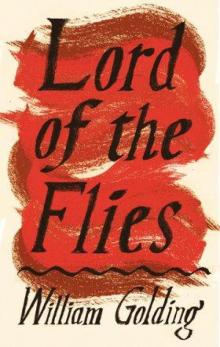 Lord of the Flies
Lord of the Flies To the Ends of the Earth
To the Ends of the Earth Free Fall
Free Fall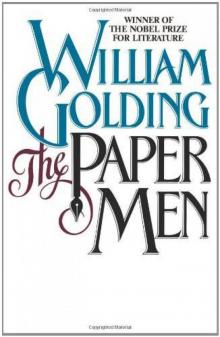 The Paper Men
The Paper Men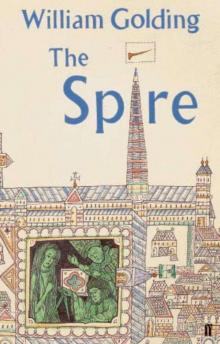 The Spire
The Spire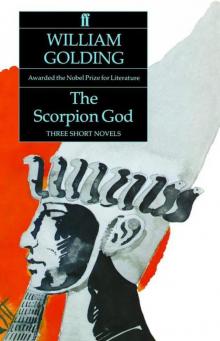 The Scorpion God: Three Short Novels
The Scorpion God: Three Short Novels The Inheritors
The Inheritors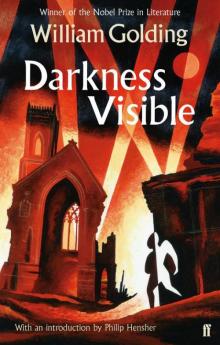 Darkness Visible: With an Introduction by Philip Hensher
Darkness Visible: With an Introduction by Philip Hensher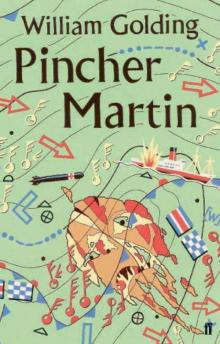 Pincher Martin
Pincher Martin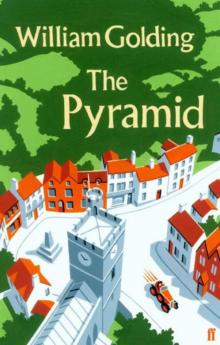 The Pyramid
The Pyramid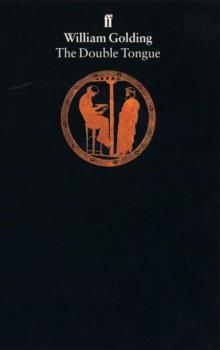 The Double Tongue
The Double Tongue An Egyptian Journal
An Egyptian Journal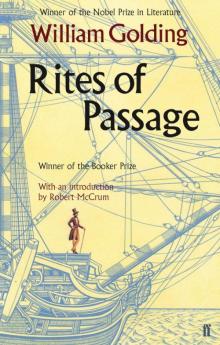 Rites of Passage
Rites of Passage Envoy Extraordinary
Envoy Extraordinary